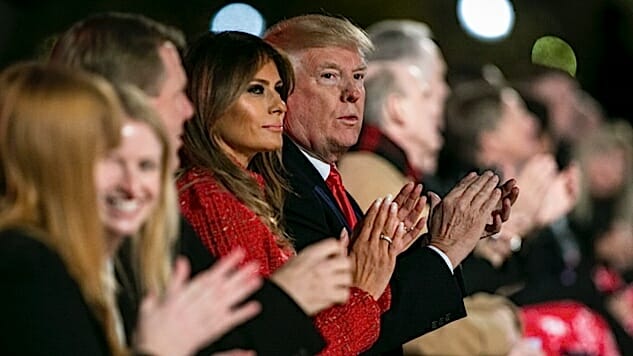Trump’s Attempt to Prosecute Clinton and Comey Was a Tyrannical Abuse of Political Power
Photo courtesy of Getty
On Tuesday, the New York Times ran a report citing information from anonymous officials that President Donald Trump told former White House Counsel Don McGahn he wanted to direct the Department of Justice to prosecute Hillary Clinton and James Comey. This tyrannical abuse of power—ordering your government to prosecute and ideally imprison your political enemies—would signal that our descent into dictatorship is complete. It is an eminently impeachable offense (Nixon’s similar albeit even milder requests were included in the articles of impeachment against him), and you’d think that in the interest of vigorously protecting the entire ideological premise of democracy, Trump would be immediately removed from office.
As of this writing, he is still President of the United States.
According to the NYT report, McGahn pushed back vigorously against the president, reminding him he can’t order the Justice Department to prosecute people because a) the Attorney General doesn’t represent his personal interests, and b) it’s an impeachable abuse of power. McGahn apparently gave the president a memo that outlined these points, though the Times was unable to obtain a copy of that memo. When reached for comment, McGahn’s own attorney cited McGahn’s non-existent attorney-client privilege with the president. (The White House counsel serves the people. The president is not in any sense a client. Same goes for his relationship to the Attorney General.)
McGahn apparently also wasn’t aware if Trump went to others with the order. To be clear about that: The White House counsel doesn’t trust the president won’t do everything he can to criminally abuse the office, and yet he served a man with those inclinations for another year and a half.
But what do we make of the news that Trump tried to strong-arm his Justice Department into prosecuting his political enemies? Well, to help understand the implications we first need to outline some connections to other stories.
First, there’s the fact so obvious it’s forgettable that Donald Trump has basically asked Attorney General Jeff Sessions to do these same things over Twitter, which are official Presidential statements. Here are a few: one and two and three and four and five and six and seven. In this light, it certainly seems the NYT report is old news.
But there is some new information here. Though Trump can argue his tweet orders to his AG weren’t exactly orders—he never gave the order in his tweets—but rather exasperation with what he perceives as an improperly imbalanced investigation (Trey Gowdy took this position with trademark integrity and aplomb), he can’t make that argument this time. Trump in fact exhibited his own consciousness of guilt with the choice to talk to McGahn in private.
-

-

-

-

-

-

-

-

-

-

-

-

-

-

-

-

-

-

-

-

-

-

-

-

-

-

-

-

-

-

-

-

-

-

-

-

-

-

-

-








































